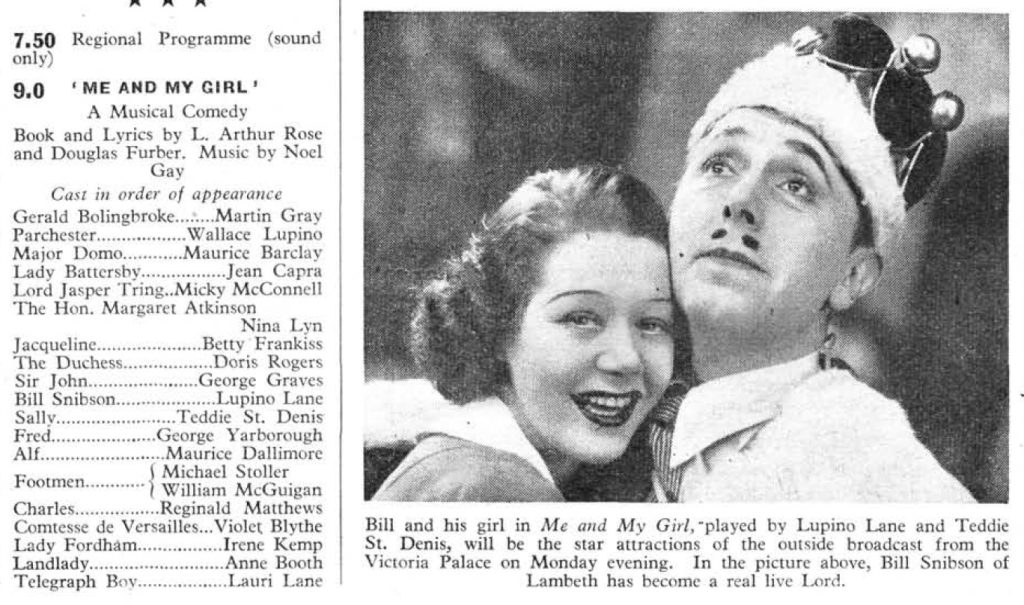OTD in early British television: 1 May 1939

John Wyver writes: ‘One of the big television occasions of the year,’ was how Radio Times (above) trailed the live outside broadcast of the musical comedy Me and My Girl from the Victoria Palace on the evening of Monday 1 May 1939. This was the hugely successful ‘Lambeth Walk’ show starring Lupino Lane and Teddie St Denis, with music by Noel Gay, that had already been running for 18 months on stage. The broadcast went down so well that the television service did it all again on 17 July.
Television had first visited a West End theatre in November 1938 for J.B. Priestley’s When We Are Married, and then in March Magyar Melody had been broadcast in full. Having responded to both previous broadcasts, Grace Wyndham Goldie filed a further despatch for The Listener:
I insist upon throwing a few bouquets… – to Mr. Lupino Lane, to the Me and My Girl company; to the television engineers; to Mr. Philip Dorté, who runs the outside broadcasts, and to the beneficent accident of fate which brought the King and Queen to Victoria Palace on the very evening when thousands of viewers were looking in.
The combined result was the most entertaining entertainment television has given us yet. Which surprised me. For, being one of the three London theatre-goers who had not been to see Me and My Girl I was unprepared for the vitality, the humanity, the gaiety and, generally, for the zip and the ‘go’ of this show.
After all, who expects the end of a musical comedy to be welcome only because it gives one a respite from laughter? And who expects a musical comedy done direct from Ihe theatre to be satisfactory on the small television screen?
But in fact Mr. Lupino Lane’s personality and methods are ideally suited to television. He does not merely play in front of a vast audience as most musical comedy actors do. He plays confidentially to a vast audience as a music-hall comedian does.
The result is that every one of his jokes is a private joke which he shares with each individual in the audience. And it doesn’t matter whether the individual is sitting in the stalls or in the upper circle or in his own arm chair in front of the television screen.
Mr. Lane’s grin still seems to say directly to him, ‘That took you by surprise, didn’t it? Well, watch me now’. It is this directness of appeal which makes for success in television. For it means that we viewers, sitting in isolation, can re-act as individuals and yet have our enjoyment increased by hearing the laughter and applause of others.
And then the King and Queen were there! Certainly this only meant for viewers that there was an electric something in the performance and that the cast turned at the end towards one of the boxes and sang ‘God Save the King’. And it was surely carrying discretion to excess neither to tell us before ‘nor after the performance who was in the Royal box.
However, even without this it was obvious that the unexpected had happened, and since this is possible only in life and in television it gave an added and a specifically televisory flavour to the evening.
Possibly on this occasion, but more likely in July, the Television service also arranged for at least two film cameras to be in the theatre alongside the OB cameras, and they recorded a number of scenes that post-war were included in the demonstration film Television is Here Again. As a consequence, this broadcast is one of the very few pre-war transmissions of which we have something close to a precious record.
Leave a Reply